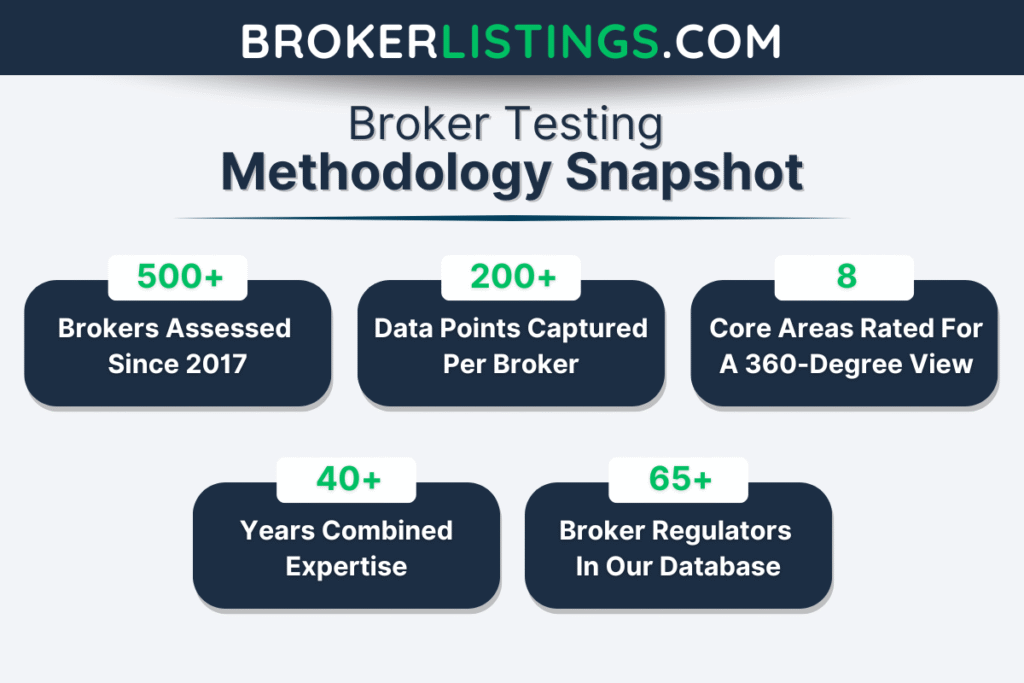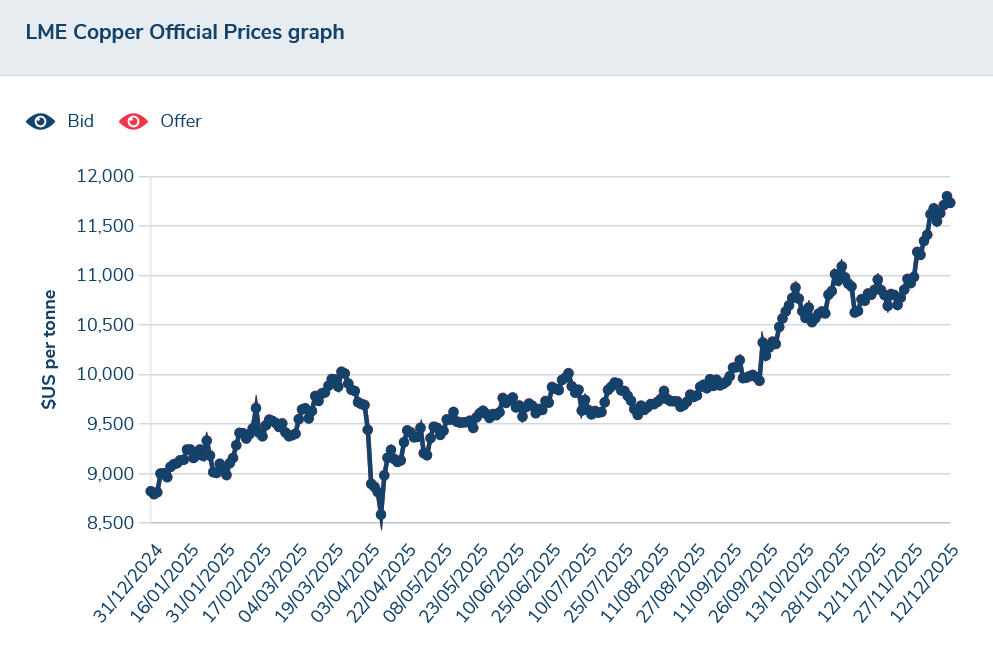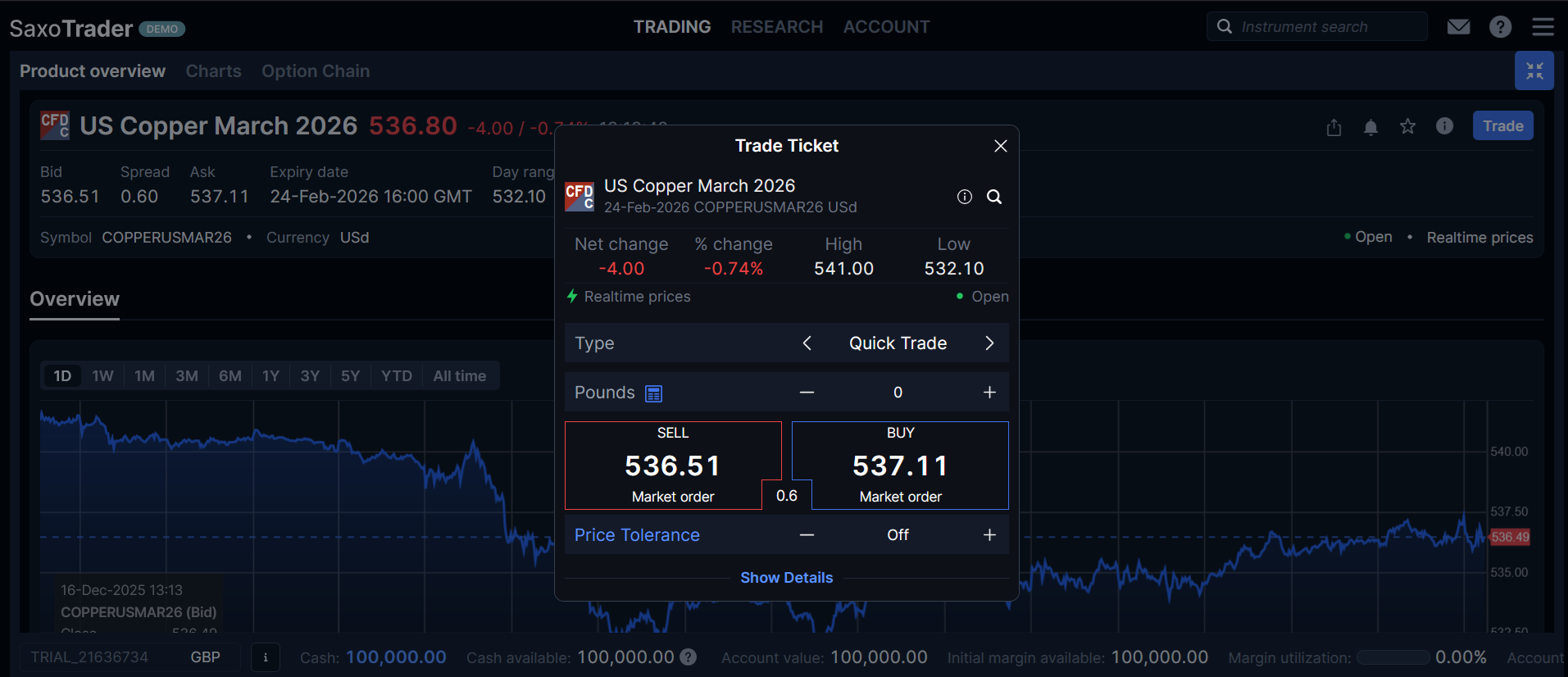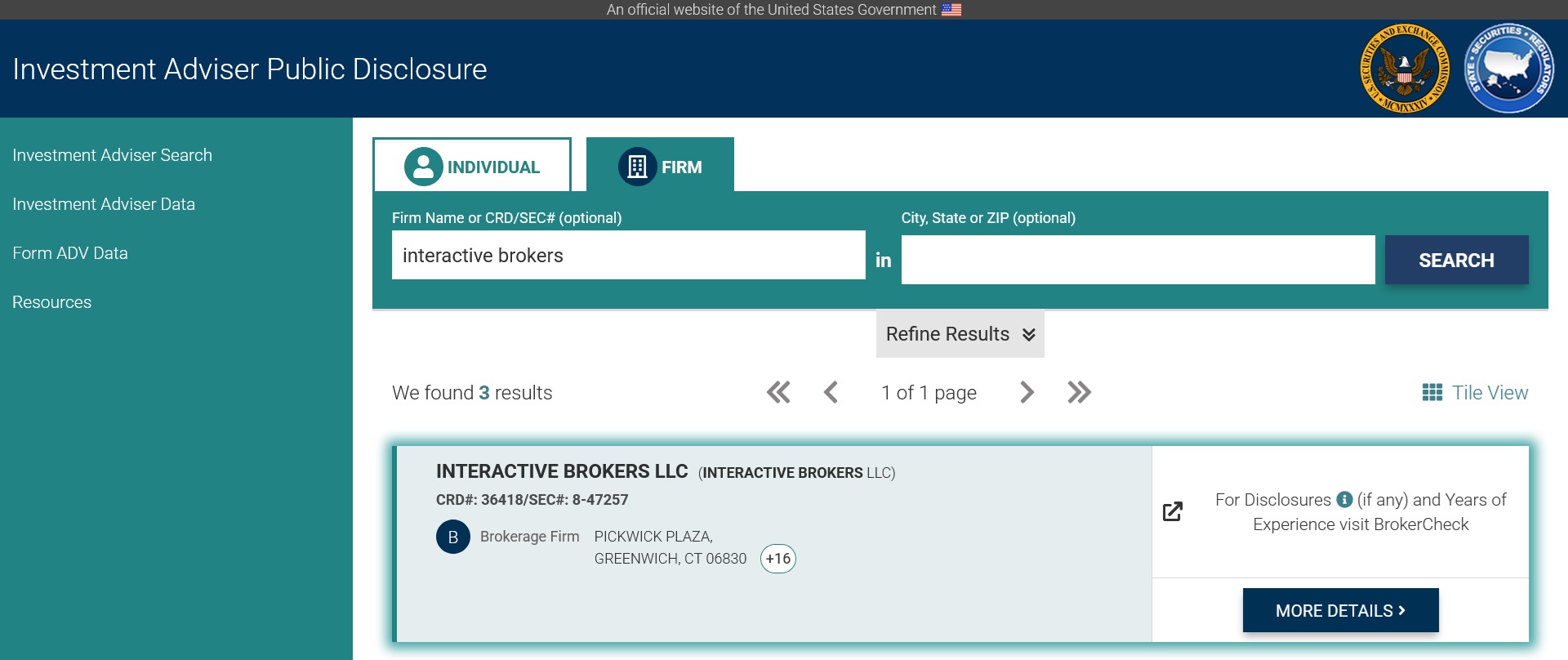Best London Metal Exchange Brokers 2026
Discover the best brokers with access to the London Metal Exchange (LME) following our rigorous hands-on testing.
-
1Interactive Brokers (IBKR) is a top brokerage firm offering access to 150 markets in 33 countries and a range of investment services. With 40 years in the field, this company listed on Nasdaq strictly follows the rules set by authorities such as the SEC, FCA, CIRO, and SFC. It's recognized as one of the most reliable brokers for global trading.
Compare Brokers
Safety Comparison
Compare how safe the Best London Metal Exchange Brokers 2026 are.
Mobile Trading Comparison
Compare the mobile trading features of the Best London Metal Exchange Brokers 2026.
Comparison for Beginners
Compare how suitable the Best London Metal Exchange Brokers 2026 are for beginners.
Comparison for Advanced Traders
Compare how suitable the Best London Metal Exchange Brokers 2026 are for advanced or professional traders.
Accounts Comparison
Compare the trading accounts offered by Best London Metal Exchange Brokers 2026.
Detailed Rating Comparison
Compare how we rated the Best London Metal Exchange Brokers 2026 in key areas.
Fee and Cost Comparison
Compare the cost of trading with the Best London Metal Exchange Brokers 2026.
Broker Popularity
See how popular the Best London Metal Exchange Brokers [year] are in terms of number of clients.
| Broker | Popularity |
|---|---|
| Interactive Brokers |
|
Why Trade With Interactive Brokers?
Interactive Brokers is ideal for seasoned traders due to its robust charting platforms, updated data, and adaptability, especially with the IBKR Desktop application. Its exceptional pricing and advanced order features appeal to traders, and its variety of stocks remains unmatched in the market.
Pros
- The new IBKR Desktop platform combines the advantages of TWS and adds unique tools like Option Lattice and Screeners with MultiSort to make trading accessible and impressive for traders of all levels.
- IBKR provides a cost-effective platform for traders by offering low fees, narrow spreads, and clear pricing.
- IBKR offers exceptional access to global stocks, with thousands of equities available from over 100 market centers in 24 countries, including the recent addition of the Saudi Stock Exchange.
Cons
- TWS's platform may be difficult for beginners to grasp because of its complexity - we were overwhelmed during our initial tests by the sheer volume of tools, features and widgets.
- IBKR offers many research tools. However, the tools are not uniformly distributed across trading platforms and the web-based 'Account Management' page, causing confusion for the users.
- Customer service may take time to respond, and there may be delays in fixing problems based on tests. It could be difficult to reach the customer service promptly.
Filters
How We Selected The Top Brokers For Trading On The LME
We verified that every brokerage listed provides trading on the LME, combing through their instruments on the platform and confirming with support where needed.
Then we applied our broker testing methodology, scoring firms on over 200 data points and weighing the views of our hands-on testers. This culminated in an overall rating which we sorted LME brokers on.

What Is The London Metal Exchange?
The London Metal Exchange (LME) is the world’s leading destination for the trading of industrial metals. Its pricing benchmarks are used by a wide range of market participants – from manufacturers to banks, miners to commodity traders – to inform investment decisions and hedge against market fluctuations.
Founded in 1877, the exchange is one of the few remaining ‘open outcry’ trading venues, where traders shout and use hand signals to buy and sell. However, the majority of trading on the exchange now takes place through its LMEselect electronic trading platform.
The LME has steadily added to its product line-up over the decades. Up until the 21st century, it was focused on non-ferrous industrial metals including:
- Copper
- Aluminum
- Nickel
- Lead
- Zinc
- Tin

3-month copper futures prices at the LME. Source: LME
The exchange’s product suite has expanded significantly since then, with the addition of ferrous metals like steel and minor metals cobalt, lithium and molybdenum in the early years of the new Millennium.
Pro tip: The exchange followed this with precious metals contracts in 2017, though gold and silver products were withdrawn five years later. Traders can still deal in platinum and palladium.
Ways To Trade The London Metal Exchange
Buying and selling metal on the LME is only available to institutional traders like banks, mining companies and commodity trading firms. Metals are traded by exchanging cash (or spot) contracts for immediate physical settlement, for instance, or by trading futures and options contracts.
Retail investors can indirectly trade on the LME, however, though the range of brokers offering derivative products directly referencing LME futures prices is extremely limited. In fact, Interactive Brokers is the only brokerage currently offering LME-referenced over-the-counter (OTC) futures contracts to retail traders.
These derivatives refer to the corresponding LME futures contract in terms of type, price, lot size and specification, though they are not themselves exchange-registered contracts.
Yet even these Interactive Brokers products are limited to:
- Copper, aluminum, nickel, tin, lead and high-grade zinc.
- Retail traders outside the US, Canada, Hong Kong and Israel.
Pro tip: There are still plenty of brokers offering base metal contracts for difference (CFDs), whose prices are influenced by (if not directly linked to) official LME contracts.
It’s also possible to trade copper futures contracts that aren’t bought and sold on the LME, as well as exchange-traded commodities (ETCs) listed on stock exchanges like the London Stock Exchange and NASDAQ.

Source: Saxo
How To Choose A Broker To Trade Industrial Metals
Key factors to consider when choosing an LME broker include:
Trustworthiness
The explosion of online trading has seen a similar boom in the number of bad actors looking to scam retail investors.
It’s not just fraudsters that you and I need to keep watch for, though. The market is flooded with brokerages that offer unreliable trading platforms, poor customer service and hidden fees.
Investors need to avoid scammers and poor service providers by checking the regulatory status of the broker they’re considering. This can often be done quickly through the websites of many global financial services watchdogs.
Pro tip: The level of protection can differ significantly among regulators, which can make selecting a broker difficult. BrokerListings.com provides a Regulator Rating System to help traders and investors find the best regulator for ultimate peace of mind.
Top broker for trustworthiness: Interactive Brokers has received regulatory approval from more than 10 of the most respected regulators on the planet. These include the UK’s Financial Conduct Authority (FCA), the US’s Securities and Exchange Commission (SEC), and Hong Kong’s Securities and Futures Commission (SFC).

Interactive Brokers’ regulatory listing on the SEC website. Source: SEC
Dealing Costs
Properly regulated brokers are required to publish clear and comprehensive lists of fees they charge their customers. These include transaction charges, account inactivity fees, overnight or swap charges, and fees for deposits and withdrawals.
You’ll need to seriously consider all of these, as well as the size of bid-offer spreads you can expect on certain products. Failing to take costs into account can significantly reduce trading profits, and particularly so for high-frequency traders.
Top broker for trading costs: IC Markets offers extremely tight spreads across its product ranges, while transaction fees are also low. Overnight fees are modest, while there are also no deposit, withdrawal or inactivity fees, which can make it an attractive choice for more infrequent traders and those wishing to take a more flexible approach.
Trading Platform
If you’re using a third-party trading platform (like MetaTrader 5 (MT5) or cTrader), the functionality and appearance of the broker’s trading platform will become a secondary consideration.
That said, you’ll still need to check the broker’s trading infrastructure is compatible with your platform of choice. You’ll also want to check other important factors like trading execution speed, platform stability, the range of order types, and the quality of customer support.
Proprietary trading platforms have come on leaps and bounds in recent years, however. So choosing a broker’s in-house system can be a good choice for both new and experienced investors, and even those who typically use third-party software providers.
If you’re considering using a broker’s own system, some key things to think about include the clarity and customizability of the trading platform; the availability of advanced charting tools and other resources; and the provision of automated trading tools and bots.
Top broker for trading platform: IG supports a wide range of third-party trading platforms, though its own platform gives the likes of MT5 a real run for their money. It’s quick and highly customizable, and traders enjoy a wealth of market analysis and research.
IG also allows traders to get up to speed with a demo account if they wish. Trading on the go is also available with the use of a mobile app.
Asset Range
Brokers offer a variety of metal-linked financial products. So think about how you want to gain exposure – not all service providers will offer exactly the same range.
Consider, then, whether you’d like to trade the market with futures contracts, and whether these must be directly linked to LME pricing (as with those from Interactive Brokers). Also think about whether CFDs or ETCs could fit in with your investing strategy, and which brokers offer these products.
Pro tip: The product you choose may also depend on whether you want to use leverage, or borrowed funds. Leverage is money borrowed from your broker, and is used to open larger positions than would otherwise be possible by simply using one’s own funds.
Be mindful, though, that the use of leverage works both ways. It can inflate trading profits, though it may also exacerbate losses if the market moves against you. Also consider the level of leverage available from different brokers if you plan to use this strategy – the amount of money one can borrow also differs among brokerages.
Top broker for asset range: Interactive Brokers, as we’ve described, is the only brokerage offering OTC contracts linked to LME base metal prices (albeit with some restrictions). Traders can also deal in copper futures on other exchanges with this brokerage, such as COMEX, as well as ETCs.
Metal-linked CFDs are not available through Interactive Brokers, however.
How To Begin Trading Industrial Metals
Broadly speaking, choosing which broker to trade with will involve me following five core steps:
- Finding a broker. This is the longest part of the process, and involves considering all of the above points as a bare minimum. The market is huge and ultra-competitive, which I’ll use to my advantage.
- Opening an account. Typically taking five to 10 minutes, I’ll need to provide details (and proof) of who I am and where I’m based. Due to regulations, I’m also likely to be asked questions on my investing experience and my trading objectives.
- Depositing some money. Sending over some cash – whether that be via bank transfer, debit card transaction, digital wallet or third-party payment provider — should only take a few minutes. I can’t buy anything without having money to draw on.
- Beginning trading. After familiarizing myself with the metals markets – not to mention the broker platform – I’ll be ready to start trading. I’ll need to think about things like entry exit points, position sizes and risk management strategies.
- Monitoring the markets. Financial markets move quickly, so I’ll need to keep a close watch for profit opportunities and to react if prices move against me. If my broker allows, I can use automated tools or trading bots to monitor price movements for me and to alert me if I need to act.
Bottom Line
Retail traders can’t trade directly on the LME. However, Interactive Brokers offers futures whose prices are linked to those of corresponding contracts on the exchange.
Investors can also choose to trade industrial metals through CFDs and ETCs, products which are available across a wide range of brokers. Whichever brokerage you choose, ensure they are properly regulated by a top-tier watchdog, and that they offer cost-effective trading through a quality third-party platform or a sophisticated proprietary trading system.
